How Afghans interpret the deadly silence of ‘old mates’
Locals who helped coalition forces in ‘the longest war’ fear for their lives.
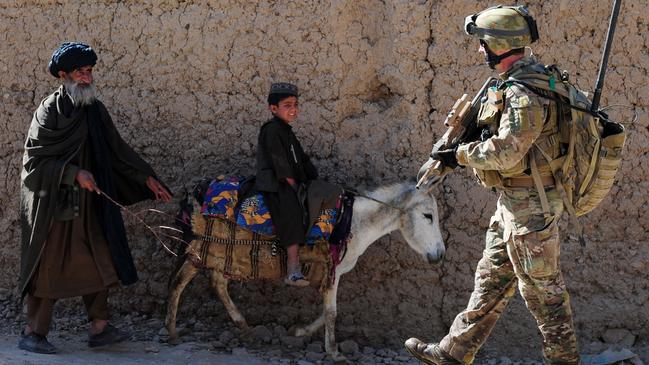
Ahmad, a former translator working with Australian troops, was in hiding with his young family when word trickled back to him that his uncle had been killed at the hands of the Taliban. He wasn’t able to return home to Faryab province in northern Afghanistan to mourn with his family, and concedes he never will – because of his work with coalition forces.
His uncle was a seasoned Afghan soldier massacred by Taliban forces in one of many assaults in recent months across the country. There’s an overwhelming sense of defeat and hopelessness in Ahmad’s voice, but it lifts slightly when he describes his motivation to work alongside Australian troops as an interpreter during the 20-year war in Afghanistan.
Unlike most Afghans in the remote parts of the country, Ahmad has an academic record and master’s degree in international relations. He says he wanted to use his education to help build a modern Afghanistan, a nation of democracy, not terrorists. Ahmad applied for a special humanitarian visa to Australia last year when his contract ended. He is yet to receive a response.
“I came back to Afghanistan to serve my people and I believed the coalition was doing their best job,” he says.
“To bring democracy, working on human rights and helping minority people in this country.
“I was working at the Afghanistan international airport where coalition forces were assisting and advising the Afghanistan army and from there I transferred to NATO’s Camp Qargha. I used to work there as a translator and interpreter. I was a supervisor of 60 interpreters there.”
Friendships were forged between interpreters and coalition soldiers over countless cups of chai; soldiers who wrote in support of the local employees as being mission-essential.
The letters paid off for many of the interpreters in the team managed by Ahmad, with many recently flown to Australia.
He’s happy for his colleagues but it’s left him confused by the silence he’s received from the only point of contact anyone has to submit their application – a group email box.
“All of the guys, except me, they received their approvals, medicals, visas,” he says.
“I sent lots of emails, made lots of inquiries but nobody answers me so I don’t know if I am rejected, if they’re processing my application, or some other comment – nobody says anything.
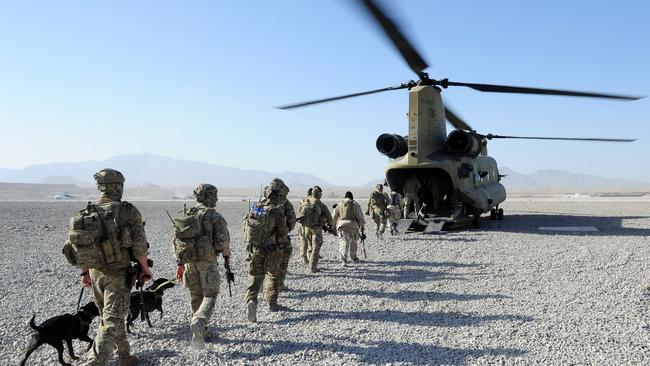
“I am changing my location every month so it is just living in fear.”
Ahmad is desperate to leave Afghanistan, as it’s the only way he sees a future for his two children. His wife, a gynaecologist, also stopped working recently after receiving repeated threats while at the hospital, he says.
“We’re scared to go outside,” he says. “The Taliban have not changed. They stone ladies, and if you’re educated they have a problem with that.
“We have lots of examples of the districts where the Taliban is blowing up the schools and the villages, women aren’t allowed to go outside. This is the same view they had 20 years ago.”
Australia has been resettling locally engaged Afghans since 2012 under a special category of humanitarian visas due to their employment in support of Australia’s mission in Afghanistan.
So far, more than 1400 visas have been granted to eligible applicants and their family members. The Home Affairs Department said it was “currently considering around 100 visa applications in the Afghan Locally Engaged Employees program”. An estimated 200 Afghan interpreters, 140 embassy guards, and numerous other locally engaged staff, including AusAID project contractors, remain in Afghanistan awaiting visa processing.
According to the federal government: “If certified as eligible by the relevant Australian agency, the locally engaged Afghan employees will then be able to make an application for a visa under Australia’s humanitarian program. They will be required to meet the standard visa criteria including health, character and security requirements.”
Bilal argues he meets the criteria set out by the government, but more than anything else he’s pleading for compassion above bureaucracy. He signed up to work as a guard at the Australian embassy in Kabul more than a decade ago, without imagining it would one day close.
Bilal admits he knew at the time it would make him visible to terrorist organisations but, as an educated man, he wanted to be part of a prosperous future in his country, which he thought would become a permanent reality.
“Everybody has a want to improve their life, improve their knowledge and improve their safety,” he says.
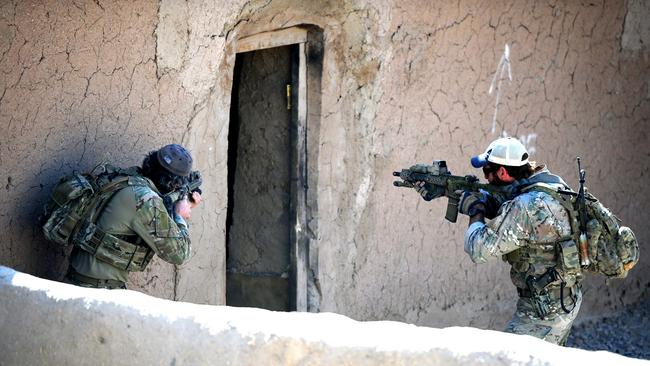
“Australia is part of the powerful world and with the coalition forces has a hate for ISIS, (and) it is because of that I started my duty (at the Australian embassy).
“We could not have foreseen that one day would come that all coalition forces and even the embassies get closed in Kabul.”
Bilal remembers a time when Afghanistan was ruled by the Taliban, a situation he dreads could be happening once more. He said a childhood surrounded by terrorists was the very thing he was working at the Australian embassy to avoid for his own children.
“I will never forget that time, I was in class six or class seven but our teachers were females but they weren’t allowed to come to school or teach their students,” he says.
“The girls were in like a prison and I don’t want that to repeat for my daughters or my wife.
“Us security guards, we don’t know why DFAT doesn’t care for our lives even though we had rifles, we had mags, everything to help save their lives.”
There’s a sense of urgency in Bilal’s voice as he recounts the graphic details of a man he says was brutally killed because of his work with coalition forces. He knows that could be his future too.
“My sadness is for my family. When I put the weapon on my shoulder and served for the Australian government I don’t care for myself – my concern is just for my wife and three daughters.”
The Chora Valley in Uruzgan is part of the Taliban’s traditional Pashtun tribal stronghold. It’s where bloody battles claimed lives often, and in complete contrast, home to Australia’s largest AusAID project worth almost $7m.
CADG, the company contracted by AusAID, boasts of the project’s achievement of having built gravel roadways, stormwater drains, gutters, walkways and culvert crossings using locally engaged staff.
One of those was project manager Sahid, who tells a different story of the cost at which it comes. He’s been found ineligible to come to Australia because of his employment by a third-party contractor.
“Once we completed the project with the Australians and they left us behind, they didn’t at least ask us ‘what can we do for you?’,” he says.
“The Taliban became stronger and they came to our homes and I was a main target for them because I was site manager and it was under my control.
“I was in high risk and several times, even when the Australians were there, the Taliban call me, message me, sent me night letters, and I didn’t take that seriously. Finally they attacked and destroyed my home.
“I know the value of foreign troops and I know the disadvantages of Taliban, al-Qa’ida and other terrorist groups. They are like fires, they are destroying everything.”
But after nearly 20 years at war, Australian troops left Afghanistan in June with only a small few still deployed on Operation Highroad to continue the drawdown at Australia’s operating hub and regional headquarters – Al Minhad air base in the United Arab Emirates. There was no fanfare to mark the occasion, with an official government announcement still yet to be made.
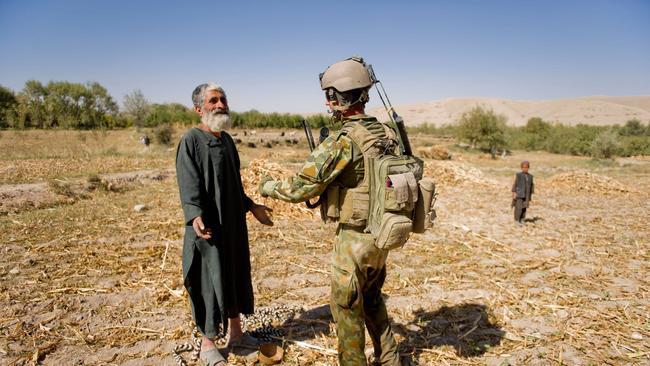
Last week, US troops switched off the lights and walked out in the dead of night, leaving their operations hub in complete darkness. The handing over of Bagram air base came without warning to Afghan security forces, who will now make use of 3.5 million US items left as a parting gift, including thousands of civilian vehicles and hundreds of armoured vehicles. Ammunition for weapons not being left behind for the Afghan military was blown up before they left. The base, just north of Kabul, is strategically vital to anyone who holds it.
Emboldened by the mass exit of NATO forces, insurgents continue to overrun military and police bases, seizing military vehicles and weapons from surrendering local forces as they gain land and power. Afghan National Army soldiers are surrendering, while others flee across borders to neighbouring countries, as Afghanistan buckles under the Taliban’s pressure.
On Thursday, the Afghan government registered 85 Taliban attacks in 24 provinces and 52 districts across Afghanistan. And in the span of just over two months, the Taliban have managed to seize at least 150 of Afghanistan’s roughly 400 districts.
On Friday, Foreign Minister Marise Payne vowed Australia will not leave behind any Afghans who helped the nation’s troops, but this is cold comfort to those who have heard nothing.
“I want an answer from them,” Ahmad says. “The situation is getting very bad, worse by the day, and they know this.”
Kate Banville is a freelance journalist, and former Australian Army soldier. Names have been changed to protect their security.


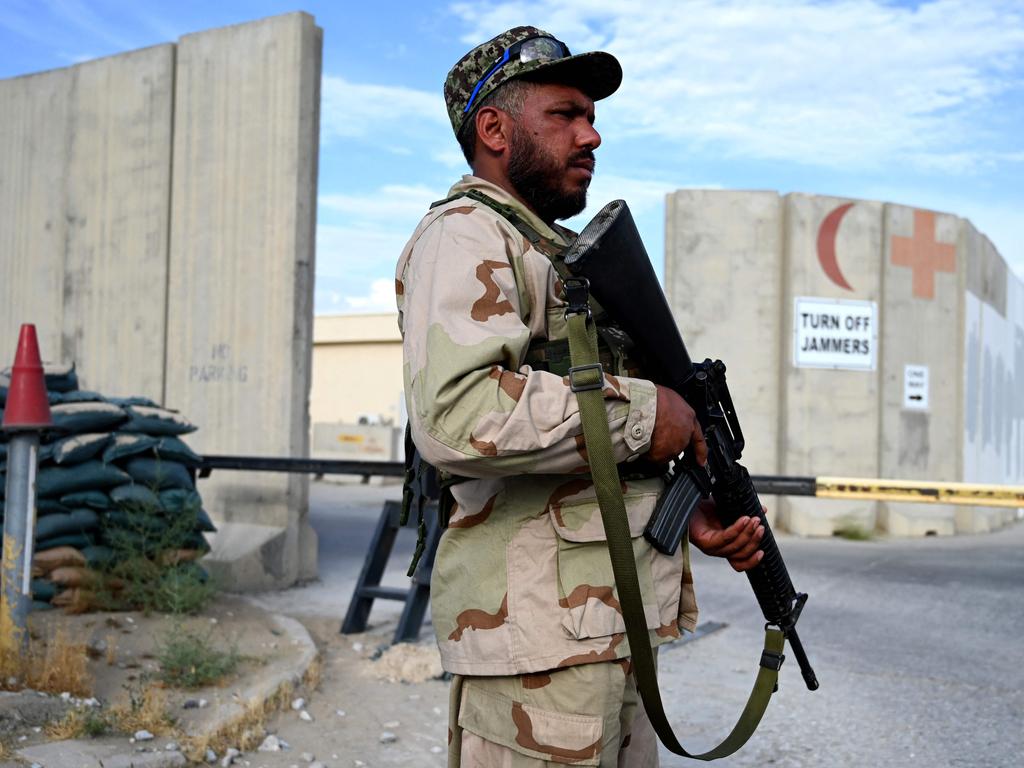
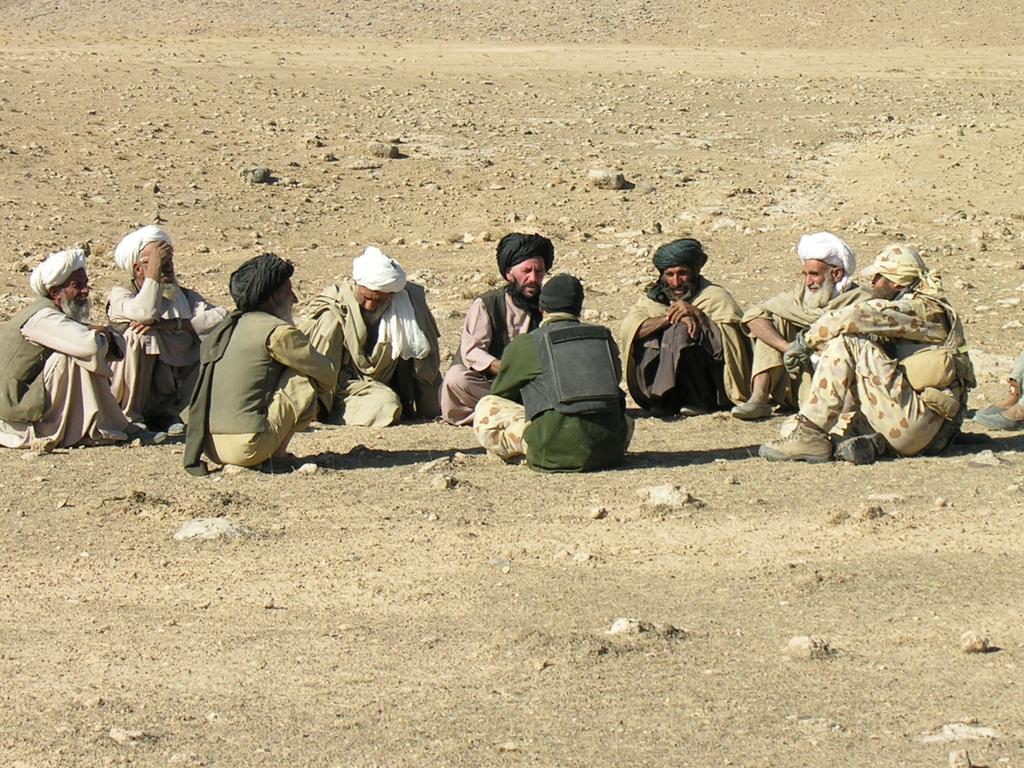

To join the conversation, please log in. Don't have an account? Register
Join the conversation, you are commenting as Logout